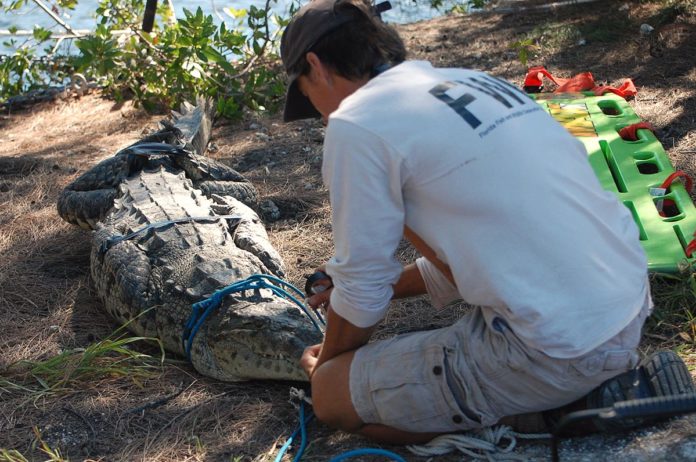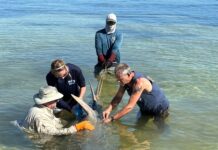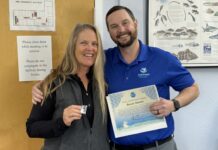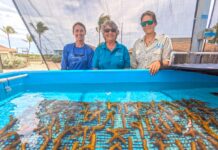DOING WELL, THANKS
The American crocodile is an endangered species success story. According to the FWC, since 1975 their numbers have increased from fewer than 300 to more than 1,500 adults. Today, they are classified as a threatened species. The number of crocodile complaints has risen as a result of their recovery and the increasing number of people living and recreating in South Florida.
DINNER’S SERVED
In the Keys, crocodiles eat fish and iguanas. They also munch on small mammals like raccoons and, unfortunately, they eye pets as food. Crocodiles are VERY attracted to the trimmings from anglers’ recent fishing trips. Rather than pushing the fish scraps into the canal next to the fillet station, just freeze them and put them out with the garbage until the crocs go in hunt of a better food source.
WHAT’S THE DIFFERENCE?
Folks always want to know about the difference between crocodiles and alligators. It’s simple: some will see you later, others after a while. Seriously, the main difference between the two is that gators are just a ‘cold weather’ version of crocodiles: they can live in climates that would kill any crocodile. Gators are black in color so they can attract more light from the sun to heat themselves; crocs are never black. Think of an alligator as a solar panel with teeth, whereas crocodiles are just teeth.
23
There are 23 crocodilian species, which include crocodiles, caimans, alligators and Gharials. There are only two saltwater crocs — the American Crocodile and the Australian Saltwater Crocodile.
TOOTHY INTERSECTION
Of the 23 different species of crocodilians in the world, two species are native to the United States, and South Florida is the only place where both of these species coexist.
NICE, BOY. NICE, CROC.
Crocodile attacks on people are very rare. Most are defensive warnings to stay away from nests. Nesting season is May and June, and hatching occurs at the end of July and in August. They are considered docile by trappers, who often use only ropes to subdue the wild animals.
FORWARDING ADDRESS?
Nope. Think of crocodiles as rock stars without a Twitter or Instagram account. And moving them across Florida Bay won’t help. If they want to come back, they will.
So, when professional trappers relocate crocodiles, they don’t advertise the new environs. Second, trappers try to find the crocs a BETTER place to stay, like a hotel upgrade, with a better habitat. Third, they really are very shy and enjoy their privacy.
TOUGH and SMART
Crocodiles are the ultimate survivors; scientists believe they have been around for about 200 million years ago. Put it this way: they have outlived the dinosaurs by 65 million years and even humans, their most worthy opponent, haven’t extinguished the species.
Weekly staff report with the help of FWC crocodile response agent Chris Guinto.
Croc talk with FWC Captain David Dipre


























